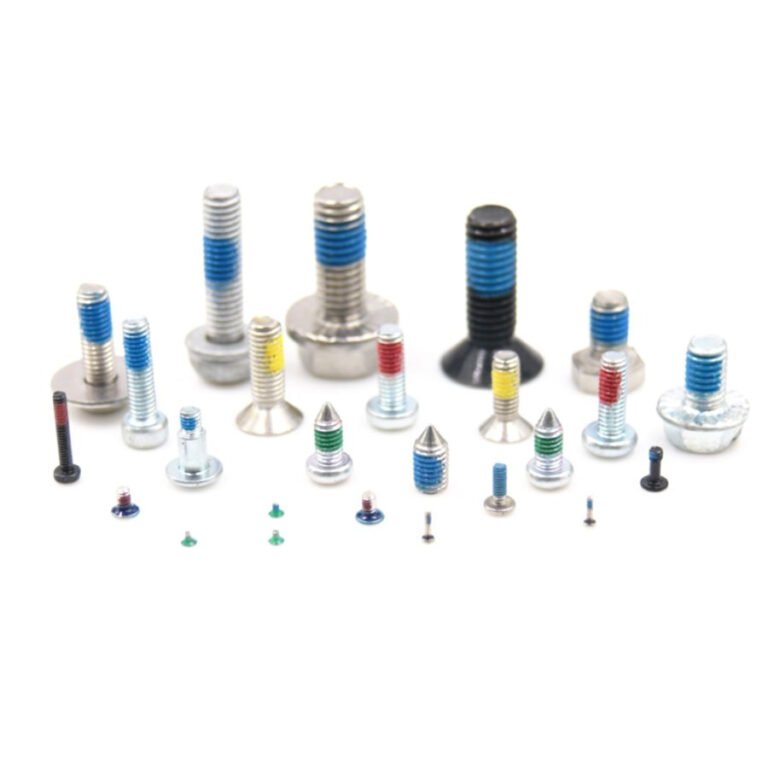Ⅰ. Overview of Thread Coating
Thread coating is a process in which specific functional adhesives are applied to threaded fasteners (such as bolts, nuts, and screws) to enhance the stability, anti-loosening properties, sealing performance, and corrosion resistance of threaded connections. Thread coating technology is widely used in the automotive, aerospace, electronics, construction, and machinery manufacturing industries.
Thread coatings can be applied during the fastener manufacturing process or manually/automatically before use. With the increasing level of automation in industrial production, pre-coating processes have become more popular among enterprises, improving assembly efficiency and reducing additional maintenance costs.
Ⅱ. Main Types of Thread Coating
Thread coatings can be categorized based on their function and chemical composition as follows:
- Anti-Loosening Coating
Anti-loosening thread coatings are used to enhance the locking performance of threaded fasteners, preventing loosening due to vibration or impact. Common anti-loosening coatings include:
- Anaerobic Adhesives:
- Primarily composed of acrylate, which cures in an oxygen-deprived environment (such as within thread mating surfaces).
- Suitable for high-vibration environments such as automotive, aerospace, and machinery applications.
- Representative brands: Loctite, 3M.
- Nylon Patch Coating:
- A layer of nylon material applied to the thread surface to increase friction and improve anti-loosening effects.
- Reusable and suitable for detachable fasteners.
- Commonly used in electronic products and precision instruments requiring frequent assembly and disassembly.
- Sealing Coating
The primary function of sealing thread coatings is to prevent liquid or gas leakage and improve sealing performance. The main types include:
- PTFE (Polytetrafluoroethylene) Coating:
- Also known as "Teflon" coating, it offers excellent chemical resistance and sealing properties.
- Suitable for fuel systems, gas pipelines, and hydraulic equipment.
- Anaerobic Sealants:
- Suitable for sealing high-pressure liquid or gas pipelines.
- Effective for metal threads, particularly in high-temperature and high-pressure environments.
- Corrosion-Resistant Coating
Corrosion-resistant coatings improve the oxidation resistance of fasteners and extend their service life.
- Zinc-Aluminum Coating:
- Provides anodic protection through zinc and aluminum, preventing thread corrosion.
- Suitable for marine equipment and outdoor machinery.
- Zinc Plating with Sealant:
- Zinc-plated threads coated with organic sealants to enhance corrosion resistance.
- Used in construction and bridges exposed to outdoor environments.
- Lubricating Coating
Lubricating thread coatings reduce friction, improve assembly efficiency, and lower tightening torque.
- Molybdenum Disulfide (MoS₂) Coating:
- Suitable for high-temperature, high-load conditions.
- Mainly used in aerospace, engine bolts, and high-performance applications.
- Graphite Lubricating Coating:
- Used in mechanical equipment requiring friction and wear reduction.
Ⅲ. Functions of Thread Coating
Thread coatings provide the following key benefits in industrial production and applications:
- Preventing Thread Loosening
In high-vibration and high-impact environments, threaded fasteners tend to loosen, affecting equipment safety. Anti-loosening coatings increase friction between threads, preventing unintentional loosening due to external forces.
- Enhancing Sealing Performance
Thread coatings fill microscopic gaps in threads, preventing liquid or gas leakage, making them ideal for high-pressure pipelines, hydraulic systems, and fuel systems.
- Preventing Corrosion and Extending Service Life
In harsh environments, metal fasteners are prone to rust or corrosion, reducing their lifespan. Applying corrosion-resistant coatings minimizes oxidation reactions and enhances the durability of fasteners.
- Improving Assembly Efficiency
Pre-coating processes reduce manual application steps, increasing production efficiency and ensuring consistent coating thickness and quality across fasteners.
- Reducing Maintenance Costs
By improving the reliability of threaded connections, thread coatings reduce the need for maintenance caused by loosening or corrosion, thereby lowering overall maintenance costs.
Ⅳ. Application Areas of Thread Coating
Thread coating is widely used in various industries, including:
- Automotive Manufacturing: Engine bolts, transmission components, and chassis fasteners.
- Aerospace: Turbine engines and aircraft structural fasteners.
- Electronics & Electrical Equipment: Precision instruments, motors, and household appliances.
- Construction Engineering: Fasteners in bridges and high-rise buildings.
- Petrochemical Industry: Thread sealing in oil and gas pipelines and high-pressure vessels.
Ⅴ. Conclusion
Thread coating plays an irreplaceable role in modern industrial production, effectively improving the reliability, anti-loosening properties, sealing performance, and corrosion resistance of threaded connections. Depending on the specific application and requirements, appropriate coating types can be selected to ensure optimal fastener performance. With continuous technological advancements, thread coating processes continue to evolve, providing more efficient and reliable solutions for industrial production.


